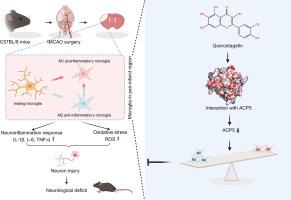槲皮素通过抑制ACP5维持巨噬细胞/小胶质细胞稳态,减轻缺血性脑卒中损伤。
IF 8.3
1区 医学
Q1 CHEMISTRY, MEDICINAL
引用次数: 0
摘要
背景:巨噬细胞/小胶质细胞引发的促炎反应在急性缺血性卒中(AIS)的预后中起着至关重要的作用。确定新的目标来调节这些细胞的稳态是必不可少的。基于这些靶点制定治疗策略可以显著改善AIS的治疗效果。目的:本研究旨在确定巨噬细胞/小胶质细胞稳态的新调控靶点,并制定有效的AIS治疗策略。研究设计与方法:采用ssGSEA和免疫荧光法(IF)观察GSE58294和短暂性大脑中动脉闭塞(tMCAO)小鼠脑内巨噬细胞浸润情况。整合MSigDB数据库,鉴定巨噬细胞/小胶质细胞相关基因(DEMAGs),并使用机器学习进一步筛选。采用ELISA、western blot、IHC和IF检测PBMCs、BV2细胞和小鼠脑组织中关键DEMAG的蛋白水平。siRNA应用于研究临界DEMAG的影响。筛选天然产物库以找到针对该蛋白的化合物。通过分子对接、分子动力学模拟、CETSA和MST分析分析化合物与蛋白质的结合。结果:本实验观察到AIS患者巨噬细胞浸润增加。上调的临界DEMAG ACP5在AIS患者的pbmc、氧葡萄糖剥夺和再氧化(OGD/R)处理的BV2细胞和tMCAO小鼠脑中更为常见。针对ACP5蛋白,槲皮素(quercetagetin, QG)被鉴定为一种抑制剂。QG可以改善tMCAO小鼠的全身失衡、脑损伤和认知障碍,部分是通过维持巨噬细胞/小胶质细胞稳态和抑制ACP5来实现的。结论:本研究表明ACP5是巨噬细胞/小胶质细胞促炎反应的新启动子,在调节AIS相关的过度炎症和氧化应激中发挥关键作用。此外,QG通过抑制ACP5减轻ais诱导的脑损伤。本文章由计算机程序翻译,如有差异,请以英文原文为准。

Quercetagetin alleviates ischemic stroke injury by preserving macrophage/microglia homeostasis via inhibiting ACP5
Background
The proinflammatory response triggered by macrophages/microglia plays a crucial role in the prognosis of acute ischemic stroke (AIS). Identifying novel targets to regulate the homeostasis of these cells is essential. Developing therapeutic strategies based on these targets could significantly improve AIS treatment outcomes.
Purpose
This study aims to identify new regulatory targets for macrophages/microglia homeostasis and to develop effective therapeutic strategies for AIS.
Study Design and Methods
Macrophage infiltration in AIS patients from GSE58294 and transient middle cerebral artery occlusion (tMCAO) mouse brain was observed using ssGSEA and immunofluorescence (IF). Integrating the MSigDB database, differentially expressed macrophage/microglia-associated genes (DEMAGs) were identified and further screened using machine learning. The protein level of the critical DEMAG in PBMCs, BV2 cells, and mouse brain tissues was detected with ELISA, western blot, IHC, and IF. siRNA was applied to investigate the effect of the critical DEMAG. A natural product library was screened to find a compound that targets the protein. The binding of compounds and proteins was analyzed through molecular docking, molecular dynamics simulations, CETSA, and MST analysis.
Results
This experiment observed increased macrophage infiltration in AIS patients. The upregulated critical DEMAG, ACP5, was more frequently detected in AIS patients' PBMCs, oxygen-glucose deprivation and reoxygenation (OGD/R)-treated BV2 cells and tMCAO mouse brain. Targeting the ACP5 protein, quercetagetin (QG) was identified as an inhibitor. QG could ameliorate systemic imbalance, brain injury, and cognitive impairment in tMCAO mice, partly by maintaining macrophage/microglia homeostasis and inhibiting ACP5.
Conclusion
This study shows that ACP5 is a new promoter of macrophages/microglia proinflammatory responses, playing a critical role in regulating the excessive inflammation and oxidative stress associated with AIS. Furthermore, QG mitigates AIS-induced brain damage by inhibiting ACP5.
求助全文
通过发布文献求助,成功后即可免费获取论文全文。
去求助
来源期刊

Phytomedicine
医学-药学
CiteScore
10.30
自引率
5.10%
发文量
670
审稿时长
91 days
期刊介绍:
Phytomedicine is a therapy-oriented journal that publishes innovative studies on the efficacy, safety, quality, and mechanisms of action of specified plant extracts, phytopharmaceuticals, and their isolated constituents. This includes clinical, pharmacological, pharmacokinetic, and toxicological studies of herbal medicinal products, preparations, and purified compounds with defined and consistent quality, ensuring reproducible pharmacological activity. Founded in 1994, Phytomedicine aims to focus and stimulate research in this field and establish internationally accepted scientific standards for pharmacological studies, proof of clinical efficacy, and safety of phytomedicines.
 求助内容:
求助内容: 应助结果提醒方式:
应助结果提醒方式:


